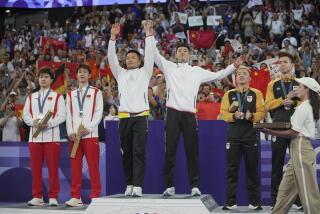Politics: President seeks a referendum on statehood. His remarks come as China, which claims the territory, faces a leadership reshuffle.
- Share via
SHANGHAI — Taiwanese President Chen Shui-bian cranked up the heat on his mainland rivals Saturday by declaring that China and Taiwan are separate countries and that the island should hold a referendum on independence.
Chen’s remarks were the most serious such verbal provocation since his predecessor pushed the archenemies to the brink of war three years ago by arguing that they should deal with each other on a “state-to-state” basis.
Beijing did not immediately respond to Chen’s comments, which were made during a videoconference with Taiwanese living in Japan. But observers said the statements were bound to enrage his Communist foes. They consider the island part of China and have expressed a willingness to reclaim it by force if necessary.
“If he really supports an independence referendum, that means he is declaring war on the mainland,” said Jia Qingguo, associate dean at Beijing University’s School of International Studies. “That would be a disaster for the people of Taiwan.”
No one seemed clear about why Chen picked this moment to push Beijing’s buttons. However, politics on both sides of the Taiwan Strait might have been a factor.
Some analysts said that Chen has been downplaying his radical independence stance since becoming president two years ago. But according to these observers, he has now consolidated his power within the Democratic Progressive Party and feels safer about courting the independence vote.
“He has been painfully restraining himself. At a certain time, he would explode. This seems to be the time,” said Shen Dingli, an international affairs expert at Shanghai’s Fudan University.
Chen also might have been bluffing.
He knows that Beijing faces one of its biggest leadership reshuffles in five decades of Communist rule, scheduled to take place this fall at the 16th Communist Party Congress. During this sensitive period, the authorities are unlikely to take any drastic military action that would jeopardize social stability. According to this view, there could be no better time to ruffle Beijing’s feathers.
Paradoxically, the two sides’ standoff persists even as cross-strait economic ties are growing ever stronger. China just beat out the United States to become Taiwan’s No. 1 export market, and millions of people from the island now live and work on the mainland.
Yet political tensions continue to define the relationship.
Last month, Beijing made much of establishing diplomatic ties with Nauru, a tiny South Pacific island nation that used to recognize Taiwan. China requires any country that wants to establish such connections with it to cut all formal ties with Taiwan. Chen responded to the symbolic setback by warning Beijing that if relations didn’t improve, Taiwan might “walk down its own Taiwanese road.”
That remark was interpreted as a veiled threat to declare independence. But it was not considered as serious or specific as what he said Saturday: “Simply put, with Taiwan and China on each side of the strait, each side is a country. This needs to be clear.”
At this point, analysts don’t believe that Beijing will respond with the same kind of saber-rattling as in 1999, after then-President Lee Teng-hui of Taiwan escalated tensions with his “state-to-state” comment. But that remains to be seen.
“To call this a turning point now is too early,” Jia said. “It depends on what he does next.”
More to Read
Sign up for Essential California
The most important California stories and recommendations in your inbox every morning.
You may occasionally receive promotional content from the Los Angeles Times.













